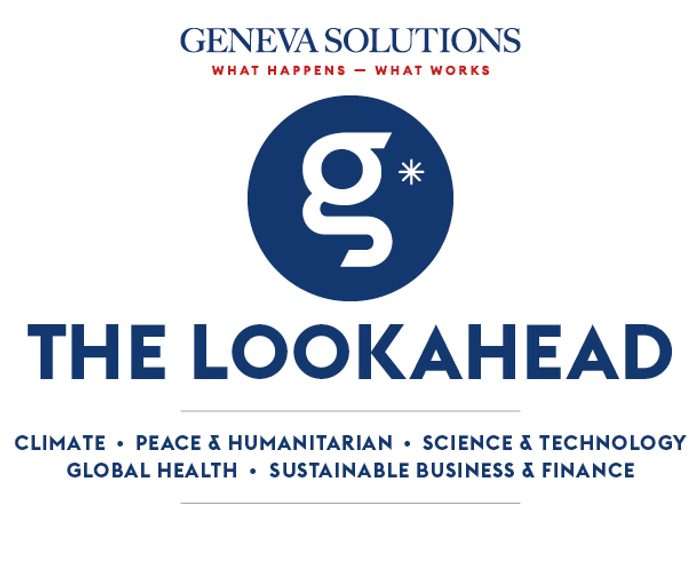Good morning, this is Paula. Ahead of this year’s UN General Assembly, at which changes at the post-World War II institution are set to be discussed, my colleague Kasmira Jefford talks to Heby Aly, coordinator of the UN reform coalition, about why the UN Charter needs a rethink.
As western donors cut back on foreign assistance, the future of aid will overtly and indirectly underpin Geneva gatherings this week, while the Palais des Nations will host a new round of talks on the reunification of Cyprus. |

Heba Aly, coordinator of the UN Charter Reform Coalition, moderating a panel at Geneva’s human rights festival FIFDH on the future of the UN, with Tim Slade, the director of the film The Veto on the challenges facing the Security Council, 8 March 2025. (FIFDH)
|
|
|
🆘AID FOCUS.
The sudden electroshock from US aid cuts resonating across Geneva-based organisations will provide an undercurrent to a number of discussions here this week.
|
|
Spotlight on debt.
Discussions about managing developing countries' debt burden running till Wednesday at UN Trade and Development will take on a new urgency now that donors are winding down aid contributions.
Public debt in 2024 is projected to hit a record $5.3 trillion – 90 per cent of GDP – according to the global trade agency.
Barbados prime minister Mia Mottley, architect of the Bridgetown initiative, will address the opening plenary just as many realise that its debt relief proposal may be just what countries need to cope with the sudden loss of US aid, beyond the impacts of the climate crisis.
Last week, Aly, former CEO of The New Humanitarian, suggested in an online panel discussion that aid reform needed to include structural policy transformations on debt and tax avoidance. Also required would be a prioritisation of assistance to the most vulnerable people and the creation of a separate fund for global public goods, such as for climate change and the environment.
|
|
Humanitarian conclave.
On Tuesday, ICVA, a Geneva-based network of aid organisations including World Vision, Medair, Plan International and Save the Children, will convene its general assembly. The donor disappearing act, exacerbated by money shifts from foreign assistance towards military build-ups on both sides of the Atlantic, will likely be on members' minds.
📖 Read our past interview with ICVA's chief, Jamie Munn: Trump orders push humanitarians to brink of ‘aid politicisation’, alerts aid chief Jamie Munn
Meanwhile, the Humanitarian Networks and Partnership Weeks will kick off today, bringing together UN agencies, NGOs and other partners remotely before they meet in person at the CICG locale from next Monday.
For those of Geneva’s aid sector that are still standing, the event's programme may seem all too routine, even as the industry faces a crisis and loud calls for a radical rethink.
|
|
🇨🇾CYPRUS TALKS.
The UN is hosting informal talks with Turkish and Cypriot leaders in Geneva today and tomorrow in an attempt to break the stalemate in decades-long negotiations over reunification of the island, which split in 1974 after Turkey invaded and took control of the North in response to a Greek-backed coup.
|
|
Guest list.
António Guterres will be flying into Geneva for the discussions. Cyprus president Nikos Christodoulides and Ersin Tatar, the head of a breakaway Turkish Cypriot state in north Cyprus recognised only by Turkey, have been invited to attend the talks, and representatives of Greece, Turkey and the United Kingdom are expected to be there.
|
|
At stake.
Greek Cypriots want a federal union, as proposed by a UN resolution, and reject Turkish Cypriots’ preferred plan of a two-state solution, which they say would mean recognising the breakaway region, with few signs that any of the two sides are ready to stand down.
|
|
⚖️HUMAN RIGHTS CORNER.
This week, the Human Rights Council is set to turn its focus towards what it deems to be the worst human rights situations requiring its utmost attention.
Tuesday will be a packed day, starting with the Fact-Finding Mission on Iran that will present its latest report in the morning, followed by a debate with the Commission of Inquiry on Syria, coming at a sensitive time for the country as it is gripped by interethnic violence.
The Fact-Finding Mission on Venezuela and the Commission of Inquiry on the war in Ukraine are slated for that same afternoon. On Wednesday, it’ll be the turn of UN-backed experts on Belarus, North Korea and Myanmar to present their findings.
|
|
Bargaining time.
With draft resolutions due on Friday, diplomats will be going full throttle to finalise their proposed texts on polarising issues, including the occupied Palestinian territories, Russia’s invasion of Ukraine, the future of abuse investigations in Syria under the new leadership and Nicaragua's increasing isolation after the Ortega regime's recent decision to quit the Human Rights Council as well as the UN agencies for labour and migration.
– By Michelle Langrand and Paula Dupraz-Dobias
|
|
|
GS news is a new media project covering the world of international cooperation and development. Don’t hesitate to forward our newsletter!
Have a good day!
|

|
|
Avenue du Bouchet 2
1209 Genève
Suisse
|
|
|
|








